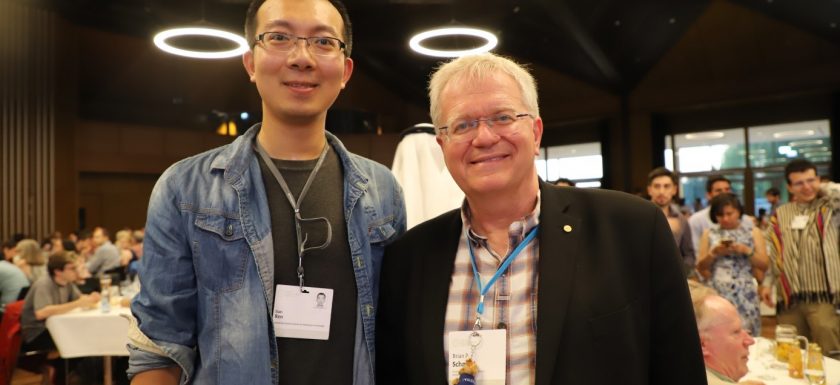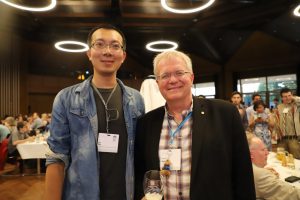
Science Without Borders: Impressions from the 69th Lindau Nobel Laureate Meeting (2019)
Guestpost by Jian Ren
As a doctoral researcher in Helmholtz-Zentrum Berlin, I have been offered many opportunities to expand my horizons by working in an optimal international research environment and by participating in international conferences. Recently, I received another gift from HZB – I was nominated and financially supported by HZB to take part in the Lindau Nobel Laureate Meetings.
580 young scientists meet Nobel Laureates
The Lindau Nobel Laureate Meetings have become an event of great importance for the exchange between generations of scientists each summer since 1951. In this year, the 69th Lindau Nobel Laureate Meeting was dedicated to physics and took place from 30 June – 5 July. 39 Nobel Laureates, 2 Turing award winners, and 580 young researchers from 89 countries visited the beautiful small town on the shore of Bodensee.
International collaboration in science is key
Participants of different colours and from different countries have shown that this is a multicultural conference, full of internationalism. What impressed me at the meeting is the fact that most of today’s scientific breakthroughs are inseparable from extensive and fruitful international research cooperation. LIGO project to detect gravitational waves provides a good example – it is made up of over 1000 scientists from over 100 institutions and 18 countries.

I personally have more direct experience of multicultural collaborations in research. I am now working in an international team led by Dr. Tristan Petit at HZB that includes researchers from France, Germany, Finland, China, India, and Iraq. Before I came to Germany, I grew up in China where I got my bachelor and master degree. I also studied in Japan as an exchange student. My research topic is to determine the influence of water on carbon nanomaterials by using synchrotron X-ray spectroscopy. This research is being undertaken by scientists from the UK, Japan, and China, and will probably provide some fundamental knowledge on the practical application of clean energy. This plays a vital part in many global issues – like climate change, energy crisis, and food security.
Global efforts are needed
Despite unarguable success having been achieved on these aspects in some countries, only continued global effort will solve these truly vexing problems completely. However, nationalism around the world is becoming a stumbling block for scientific collaboration. In Europe, the attractiveness of the UK to European scientists is declining due to the uncertainty of Brexit. On both sides of the Pacific, the trade war between China and US is gradually closing the door to scientific and technological collaboration. Staffs at Huawei Technologies have been banned by the Institute of Electrical and Electronics Engineers (IEEE, the world’s largest technical professional society) from taking part in peer review of research papers, including those serving as editors for journals, after the Chinese telecommunications equipment maker was added to a US trade blacklist. Although the ban was revoked by IEEE a few days later, harm was done to research collaborations and will continue.
Concerns on rising nationalism
Discussions on this topic could be observed everywhere during the Lindau meeting, from the opening ceremony, in lectures, and in the open exchanges. This is not surprising, because the concerns about nationalism are an integral part of the original intention and natural mission of the Lindau Nobel Laureates Meetings – the fostering of exchange among scientists across different generations, cultures, and disciplines.
Mission of #LINO19: Fostering exchange and collaboration
At the opening ceremony, Countess Bettina Bernadotte, the President of the Council for the Lindau Nobel Laureate Meetings, announced the official launch of the “Lindau Declaration 2020” project in response to the speech by Nobel Laureate Elizabeth Helen Blackburn at the 2018 Lindau Meeting. In last year’s speech, Blackburn called for widespread support of a new approach to global, sustainable, collaborative, and open science.
The “Lindau Declaration” on Open Science
According to Countess Bernadotte, the final text of “Lindau Declaration 2020” project is scheduled to be published in April 2020 and opened for signature. During the intervening time, everyone can provide ideas and suggestions. Can the open experiment of the Lindau Declaration bring in more scientists? Can the international scientific community more effectively cope with the threat from the rise of nationalism? What would be the result of more collaborative efforts of scientists? The answers to these crucial questions depend on the proactive response of the international research community.
As a young scientist, I am not pessimistic about the future. I believe the phrase from Brian P. Schmidt, 2011 Nobel Laureate in Physics, from his keynote speech at this year’s Lindau Meeting: “There is nothing that cannot be solved”.
Postskriptum: You are invited to give comments and ideas to improve the “Lindau Declaration 2020” project: http://lindau-declaration.org/
